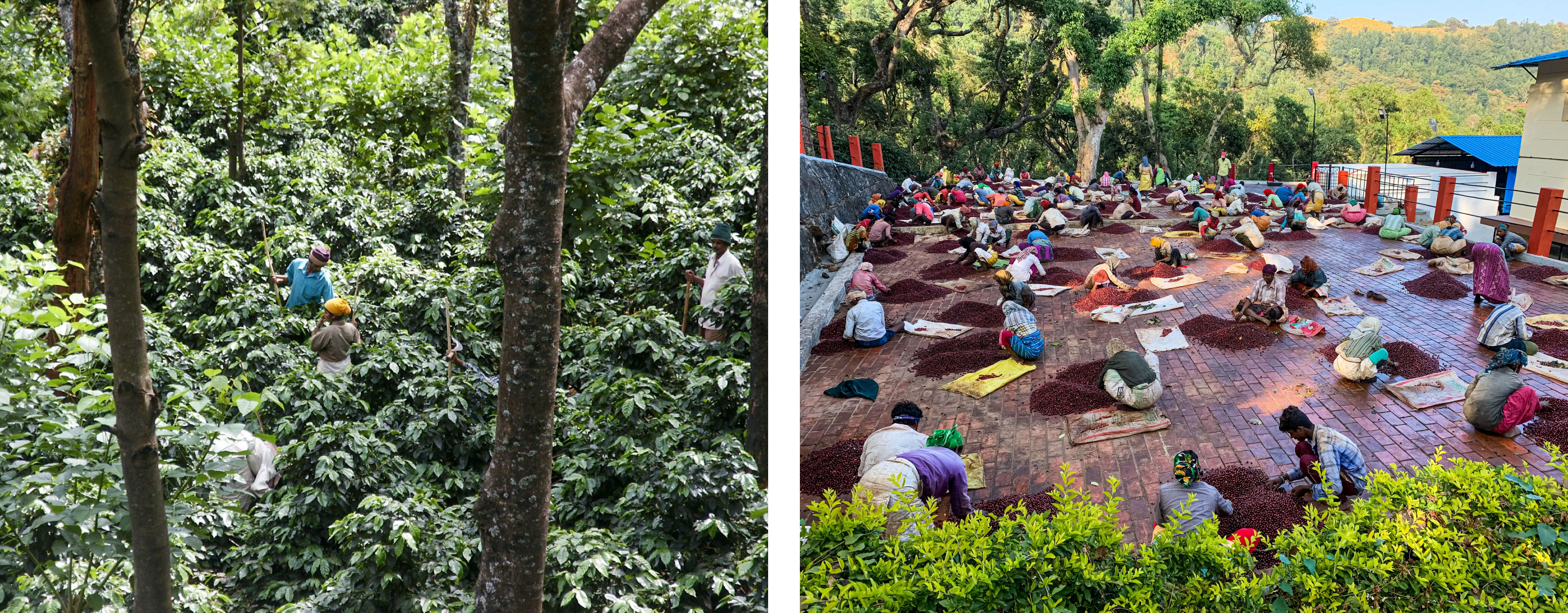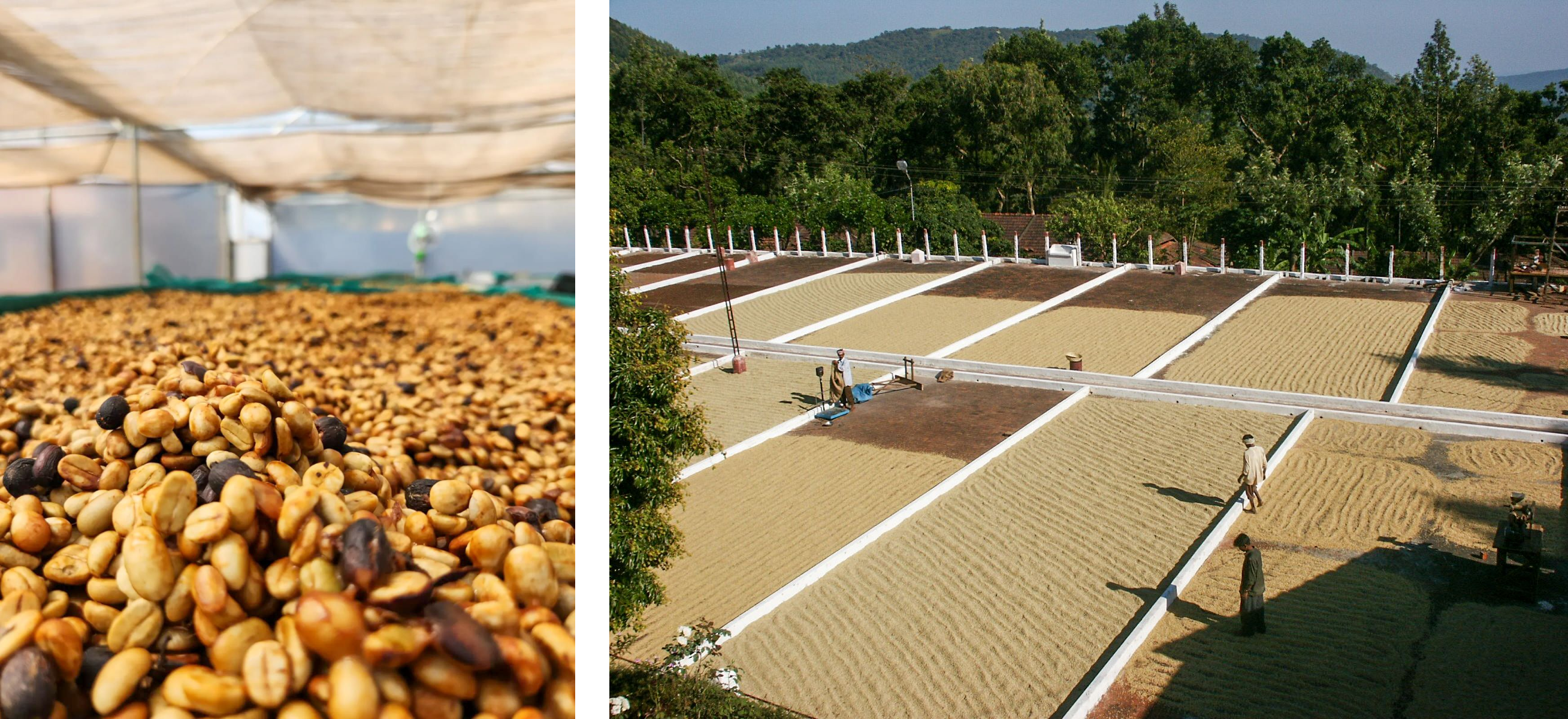
The Western Ghats, or Sahyadri mountain range, runs parallel to the coast along the western edge of India, reaching south into the Karnataka State. Westerly monsoon winds carry dense rain clouds that break on the intercepting mountain range, sustaining the rainforest’s flora, fauna, and wildlife. Ratnagiri Estate is situated in the southwestern Ghats’ foothills, where the mountain meets the Deccan Plateau near Bababudangiri, the birthplace of India’s coffee production. This abundant mountainside is canopied by silver oak trees, shading the coffee that’s been grown below for generations. The Patre family founded Ratnagiri Estate in 1927, and Ashok Patre assumed ownership in 1989. Since then, Ashok has revolutionized coffee production on his farm and in India.

India may not be well-known for its specialty coffee production, but over the past five years, we’ve been consciously sampling more coffee from here in search of a source to introduce India microlots to our offerings. We met Ashok Patre a few times in recent years and finally sampled his coffees in early 2023. Using our newly developed cupping form, The Coffee Rose, the quality of the offerings was evident. As Ashok told us, “Slowly, we were successful because the coffee spoke for itself… It was a long journey, but well worth it because we were able to showcase that even India can produce some really good specialty coffees.”

We met Mr. Patre at SCA Expo in Portland most recently and learned more about him, his farm, and his production ethos. He exudes humility and deep coffee wisdom as he explains the farm’s transformation since his ownership began. Converting from a traditional coffee farm to a specialty-focused operation is a risk, especially within a country where nearly 75% of the coffee produced is Robusta. After taking over the farm in 1989, Ashok only practiced washed processing like his family before him. In 2010, though, he noticed the single-origin trend in cafes and the industry’s push for higher-quality offerings. In 2016, Ashok produced his first honey-processed coffees and slowly started adapting production toward specialty to meet this demand. The risk in this change was finding customers, but the reward was surviving the rising cost of inputs and labor and the pressure of climate change. Year by year, Ashok reevaluated all aspects of production. He began with cherries by implementing more selective picking over five to six rounds, followed by intensive sorting before processing. “We feel that is most important in Specialty to start with.” He then invested in infrastructure by constructing a mill, drying houses, and a washing station outfitted with fermenters.

Every aspect of production and process is controlled at Ratnagiri Estate, and 60% of the 117-hectare farm’s volume is Specialty grade. Ashok is focused on eco-friendly farming – “The only thing we use is fertilizers, and in case we have a pest attack, it is always biological control… I have seen a lot of farms all over the world [who] by indiscriminate use of pesticides and herbicides…ruin their farms.” Varieties grown at Ratnagiri include Catuai, Catimore, Cauvery, SL-9, and Hemavathi intercropped with fine pepper. Fifteen unique processes have been applied to the offerings available this harvest. There are multiple modulations of washed, carbonic maceration naturals, anaerobic naturals, yeast-fermented naturals, aerobic fermented honeys, and their signature carbonic macerated washed. Learn more about these processes on our Education page.
The carbonic macerated washed coffees are harvested at 23-27⁰ Brix, fermented anaerobically in-cherry for 48 hours, then depulped. The depulped seeds are placed in large stainless-steel fermenters which are then purged with carbon dioxide gas, and the coffee ferments for 90-120 hours. After removing the seeds, they are washed, soaked for 24 hours, and dried for 25-27 days. This incredible labor-and-time-intensive process produces coffee wholly unlike traditional washed India arabica. This year, we’ve found medium-intense tart acidity, clean sweetness, jammy berry notes, and cocoa or nut structure in the cup.

Ashok’s intention is to showcase India in a new form, and Ratnagiri Estate coffees do. We are grateful that Mr. Patre’s interest in specialty coffee was sparked over 10 years ago and that these offerings have reached our warehouse. As Cafe Imports sources throughout more regions, we find ourselves walking through farms that, in previous years, would not have been considered a specialty source. The forward-thinking producer, though, challenges the industry’s conception of what good coffee is and where it comes from, changing the landscape. Ashok is emblematic of this new era in coffee, and we can’t wait to walk his farm and facilities later this year.
To find out when coffees land, watch more interviews like this, and join our events, follow us on Instagram @cafeimports.
For a unique India offering on your espresso or filter bar, view our Ratnagiri Estate offerings now.
